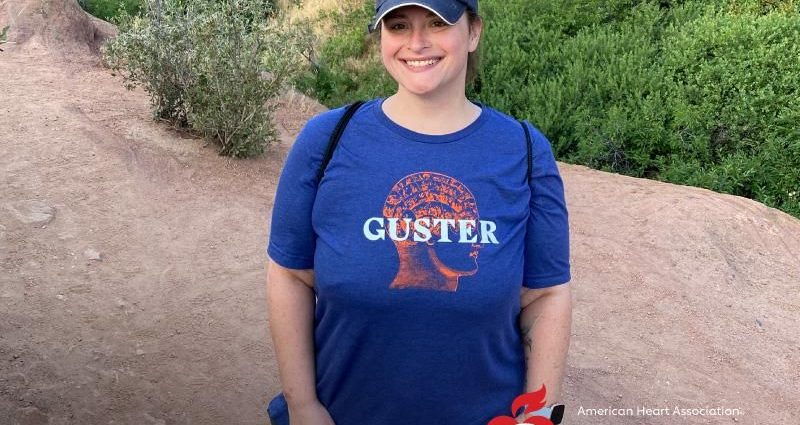FRIDAY, Jan. 21, 2022 (American Heart Association News) — A few weeks before Thanksgiving, Ken and Morgan House of Newington, Connecticut, spent a week at one of her favorite places – Disney World. They walked to all the theme parks, went on countless rides and shared healthy meals.
Every day, Morgan would smile broadly at Ken and shoot him an expression that said, “Do you even believe this?”
The last time the Houses were there, Morgan weighed 357 pounds. Ken weighed 280.
While they enjoyed the trip, Morgan couldn’t walk for more than 10 minutes without needing to take a break, her knees hurt and she didn’t fit on some of the rides, including Avatar Flight of Passage, one of her favorites.
That was in January 2020.
In November 2021, Morgan weighed 194 pounds. Ken weighed 225.
“I wasn’t struggling to get in and out of rides,” Morgan said. “I wasn’t struggling to walk. In fact, I was doing 15,000 to 20,000 steps a day without batting an eye.”
One day, she cried with gratitude exiting Flight of Passage.
The tears of joy were as much about conquering her lifelong struggle as they were about enjoying that ride.
“Being overweight prevented me from being my best self, my confident self,” she said. “You internalize how society views you as a fat person.”
In high school, she began what would become years of trying various diets and workout plans. Her weight yo-yoed, always ending higher.
In her 20s, she started getting migraines and was diagnosed with fibromyalgia, a condition marked by pain. Later, she developed sleep apnea and prediabetes.
Doctors recommended bariatric surgery. Morgan saw that as a last resort. She wanted to continue trying to lose the weight on her own.
In her 30s, her struggles continued. Between pain from the fibromyalgia and a lack of activity, “I kind of spiraled,” she said.
“Once my weight got to a certain point, I had depression, anxiety and felt out of control,” she continued. “My life was feeling unmanageable.”
Morgan was in her early 20s when she met Ken. They married five years later.
“She was always beautiful to me, and I’ve always loved her,” Ken said. “But I saw the weight as impacting her quality of life and self-esteem.”
A few years ago, a doctor encouraged Morgan to learn more about gastric bypass surgery. It’s not enough to want the operation; patients must meet certain guidelines to qualify. These include a willingness to make permanent lifestyle changes.
“I thought, ‘This is a tool that can physically help me,'” Morgan said. “It was very scary, and I had a lot of emotions, but it also felt promising.”
Ken, meanwhile, was having his own middle-age wakeup call. He’d long been on medication for high blood pressure.
“I always knew I was too heavy, but it just didn’t bother me,” he said. “Then my physician told me I was a ticking time bomb for stroke and heart attack because of my blood pressure, heart rate and metabolic panel.”
He was also developing sleep apnea. He’d wake up in the middle of the night feeling like he was drowning. He feared leaving behind Morgan and his daughter from a previous relationship.
“I want to be there for both of them,” he said.
Ken vowed to walk 10,000 steps a day. He aimed to limit his daily diet to 2,000 calories.
As he began slimming down, Morgan received the OK for the bariatric surgery. She underwent the procedure in September 2020, then began adjusting to her new life.
“I might think, ‘Oh, I can’t fit between that chair and the wall’ – when, in fact, now I can,” she said. “It’s a weird feeling.”
Another weird feeling: Adjusting to people treating her differently just because there’s less of her. It makes her angry.
“At 357 pounds, I felt invisible,” she said. “Then when you’re the same person but 163 pounds lighter, you’re suddenly visible.”
The weight loss has made them healthier.
Ken said his sleep apnea is gone and he’s in the best shape of his life. Morgan is especially excited about walking long distances without knee pain.
She’s looking forward to their Disney-themed vacation for her 40th birthday on Jan. 28.
American Heart Association News covers heart and brain health. Not all views expressed in this story reflect the official position of the American Heart Association. Copyright is owned or held by the American Heart Association, Inc., and all rights are reserved. If you have questions or comments about this story, please email editor@heart.org.
By Diane Daniel
Copyright © 2026 HealthDay. All rights reserved.

